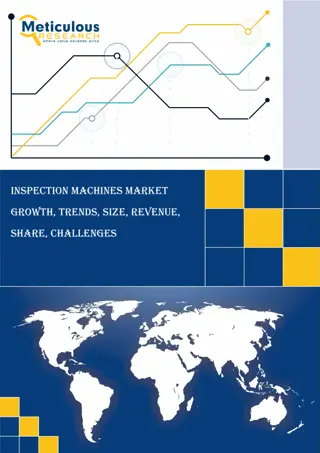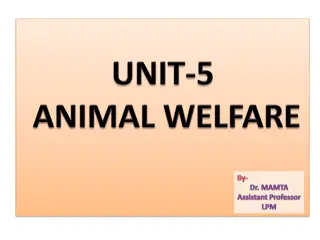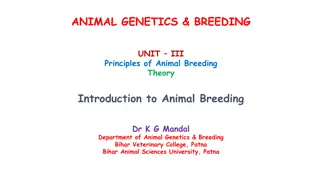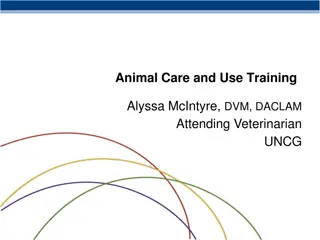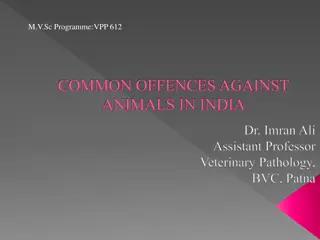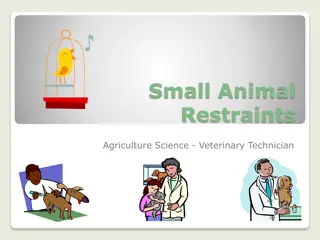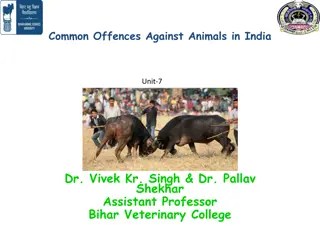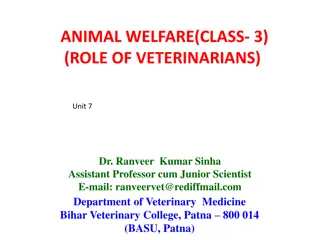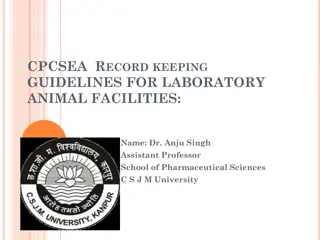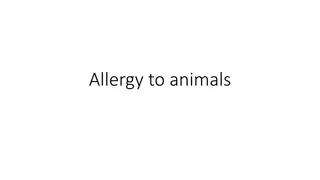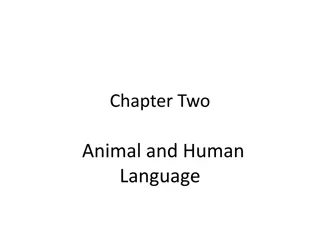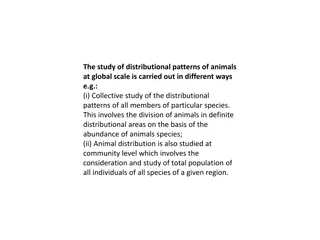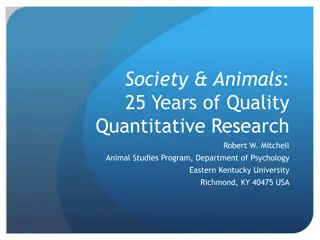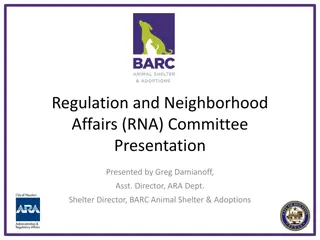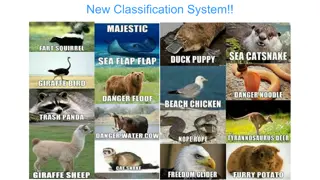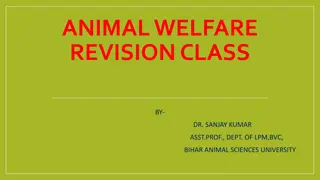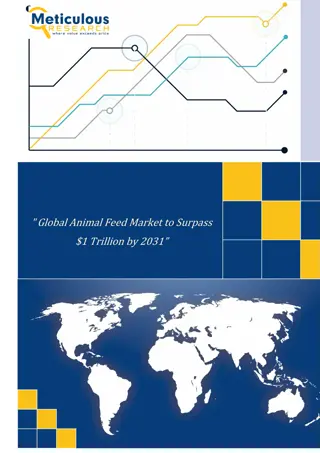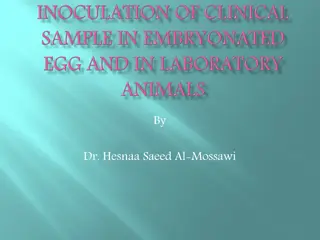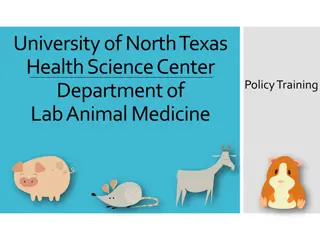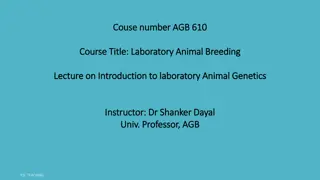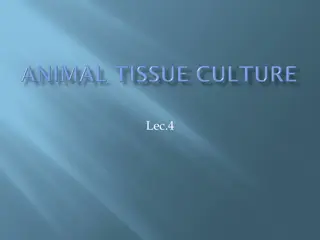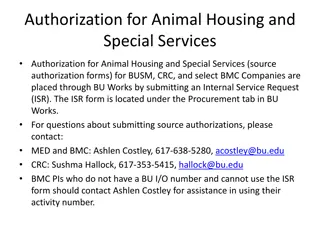History and Educational Programs of DEU Lab Animal Science Department
Established in 2004, the Department of Laboratory Animal Science at Dokuz Eylul University Institute of Health Sciences offers cutting-edge education focusing on animal welfare and ethical practices in scientific research. The department upholds the 3R Principle—Reduction, Refinement, Replacement�
0 views • 9 slides
Responsibilities of Facility Animal Care Committee at McGill University
The Facility Animal Care Committee (FACC) at McGill University oversees animal activities, ensures ethical treatment of animals, and adheres to guidelines from organizations such as the Canadian Council on Animal Care (CCAC). Responsibilities include continual oversight of animals, approving care pr
1 views • 13 slides
Feed Software Market is expected to reach $456.1 million by 2030
The growth of this market is attributed to the adoption of digital technologies and automation in the animal feed industry, the growing animal population, increasing demand for healthy animal-based food products, increasing animal health expenditure and pet insurance, and the growing need to reduce
0 views • 4 slides
Animal Welfare and Ethics: Standards and Regulations in India
The content covers a wide range of topics related to animal welfare, ethics, and laws in India. It delves into the definition of animal welfare, the role of veterinarians, animal welfare organizations, regulations like the Prevention of Cruelty to Animals Act, and protection of wildlife, working ani
0 views • 15 slides
Principles of Animal Breeding: Introduction and Historical Perspective
This unit covers the introduction to animal breeding, the application of genetics principles in breeding, historical perspectives including the work of Robert Bakewell, and key events in animal breeding evolution. Topics include breeding systems, importance of animal breeding, and notable figures in
1 views • 12 slides
Importance of Training in Animal Care and Use for Research
Training in animal care and use is essential to ensure humane and appropriate treatment of research animals, promote regulatory compliance, and uphold high standards of science and animal well-being. The presentation covers the necessity of training, goals including reviewing animal use and identify
0 views • 53 slides
Common Offences Against Animals in India: Overview and Consequences
There are three common offences against animals in India: mischief, cruelty, and bestiality. Mischief involves killing, poisoning, or harming animals, punishable under IPC Sections 428 and 429. Cruelty includes acts like beating, overloading, and starvation, regulated by the Prevention of Cruelty to
0 views • 21 slides
Small Animal Restraints and Safe Handling Practices in Veterinary Technology
Importance of safe practice when working with small animals includes preventing harm, reducing injury, and minimizing stress. Proper animal handling methods and tools are crucial for the safety of both animals and handlers. Common methods of handling different species, demonstrating appropriate anim
1 views • 22 slides
Understanding the Difference: Animal Rights vs. Animal Welfare
Explore the nuanced distinction between animal rights and animal welfare, delving into the ethical considerations, philosophies, and advocacy efforts surrounding these concepts. Discover how animal rights proponents emphasize the equal rights of animals, while animal welfare focuses on humane treatm
0 views • 36 slides
Money Laundering Offences and Investigations in Bangladesh
Bangladesh's Financial Intelligence Unit can authorize investigation agencies to investigate predicate offences, but who will investigate money laundering offences? The Money Laundering Prevention Act, 2012 outlines penalties and forfeiture of property for such offenses. Entities such as banks, fina
0 views • 12 slides
Understanding Criminal Offences: A Comparative Analysis
Exploring the concept of criminal offences, this article delves into the definitions in common law and continental law systems. It discusses the structural elements, harmful nature, prohibition, punishment, and distinctive aspects of criminal acts. A comparison between common law and continental law
1 views • 33 slides
Comprehensive Approach to Address Sexual Offences: Insights from Dr. P. B. Gujaral
Dr. P. B. Gujaral, a Senior Consultant in Forensic Medicine, highlights the significant impact of sexual offences, emphasizing the need for a thorough medico-legal examination and comprehensive care for survivors. He discusses the existing protocols, identifying fatal mistakes, and the evolution of
0 views • 10 slides
Conference on Adjudication and Compounding of Offences under Companies Act, 2013
The Two Days Regional Conference of ICSI WIRC focusing on the facilitation of corporate growth through discussions on adjudication and compounding of offences under the Companies Act, 2013. The event, presented by CS (Dr.) D.K. Jain, covers topics like fraud, wrongful gain and loss, punishment for f
0 views • 51 slides
Common Offences Against Animals in India: Understanding Mischief, Cruelty, and Bestiality
Offences against animals in India encompass mischief, cruelty, and bestiality. Mischief involves killing, poisoning, and maiming animals, punishable under the IPC. Maiming makes animals permanently useless, often to harm owners. Cruelty includes beating, overloading, starvation, and other forms of a
0 views • 17 slides
Role of Veterinarians in Animal Welfare
Veterinarians, especially with the increasing number of female professionals in the field, play a crucial role in promoting animal welfare through daily practices, advocacy, education, and research. They are involved in various sectors like biomedical, wildlife, and farm animal research, as well as
3 views • 10 slides
Exploring Animal Management and Sociology in Education
Discover the intersection of animal management and sociology in education through a comprehensive course structure that covers topics ranging from animal welfare and ethics to practical husbandry. Dive into the significance of animal care in the UK economy and learn about various career paths in thi
2 views • 19 slides
Laboratory Animal Facilities Record-keeping Guidelines
Guidelines for maintaining records in laboratory animal facilities include provisions for animal housing, staff records, health monitoring, and standard operating procedures. Compliance with CPCSEA regulations ensures ethical review procedures for animal research proposals. Focus is on providing a s
6 views • 11 slides
Procedure and Jurisdiction Under a Specific Act for Investigation of Offences
The investigation and identification of property of an accused person under a specific Act involves powers vested in the investigating officer, special judge appointments, reporting to the BFIU, investigation by the Investigation Agency, trial procedures, and the necessity of government approval. Of
0 views • 11 slides
Understanding Allergies to Animals and Living Organisms
Allergies to animals and living organisms are a result of specific immune processes triggered by allergenic substances like proteins and peptides. This allergic response can be caused by various animal proteins such as dog allergens Can f.1, Can f.2, and Can f.3, and cat allergen Fel d1. The represe
1 views • 10 slides
Uniqueness of Human Language and Communication Contrasted with Animal Communication
Human language possesses unique properties such as reflexivity, displacement, and arbitrariness, setting it apart from animal communication. These distinctions enable humans to communicate abstract concepts, discuss past and future events, and use arbitrary linguistic forms. The contrast between hum
1 views • 17 slides
Understanding Global Animal Distribution Patterns
The study of animal distribution patterns at a global scale involves analyzing species abundance and diversity in specific areas. Factors like environmental conditions, latitudes, and evolutionary history influence animal distributions. There are horizontal and vertical zones of animal distribution,
1 views • 25 slides
Exploring Human-Animal Interactions through 25 Years of Quality Research
Delve into the interdisciplinary realm of human-animal interactions with a focus on social sciences and quantitative research. Discover key themes such as social psychology, therapy, animal welfare, and more. Explore attitudes and personality differences related to animal treatment, empathy, and bel
1 views • 26 slides
Victimisation and Agency in Young Women Who Commit Violent Offences
This study delves into the victimisation and agency experienced by young women who commit violent offences, exploring their subjective perceptions of violence, sources of self-perception, impact on behavior, and portrayal in societal discourses.
0 views • 26 slides
BARC Animal Enforcement Programs and Protocols
BARC Animal Enforcement is responsible for addressing dangerous, aggressive, and nuisance dog cases in the community. Through a structured priority matrix and enforcement tools, BARC aims to ensure public safety and animal welfare. The process involves investigation, designation determination, and c
0 views • 15 slides
SASAS Strategic Plan Vision 2025 - Summary and Objectives
The SASAS Strategic Plan Vision 2025 aims to develop capacity in animal science to enhance animal production systems sustainably, promote welfare, job creation, and poverty alleviation. Informed by local, regional, and global imperatives, it aligns with the National Development Plan 2030, African Un
0 views • 11 slides
Mandatory Reporting of Child Sexual Offences: Understanding Section 229BC of the Criminal Code
This session delves into the mandatory reporting requirements under section 229BC of the Criminal Code, focusing on the application, operational aspects, and key controversies. The amendments following the Royal Commission into Institutional Responses to Child Sexual Abuse are discussed, emphasizing
1 views • 43 slides
Football Cards and Offences Statistics as of July 15
This data presents detailed statistics on football cards and offences recorded as of July 15. It includes information on red cards, total cards, types of offences, distribution of cards, and the breakdown by competition. The visuals provide insights into the number of cards issued, the nature of off
0 views • 7 slides
Exploring the Evolution of Animal Classification
Unveil the fascinating world of animal classification with a new system, delving into the definition of animals, informal groups, key events in animal evolution like symmetry and germ layers, embryological development of protostomes and deuterostomes, tissues formation, body cavity types, and cephal
0 views • 34 slides
UK Sanctions and Financial Crime: Interplay, Types, Enforcement, and Offences
The UK sanctions landscape post-Brexit, governed by the Sanctions and Anti-Money Laundering Act 2018, focuses on financial sanctions, human rights, anti-corruption measures, immigration, trade, and transport sanctions. The system allows for the issuance of licenses for specific activities under sanc
0 views • 13 slides
Understanding Animal Welfare and Ethics in Veterinary Practice
Animal welfare is about ensuring the well-being of animals by providing proper care, treatment, and humane handling. It involves considering their physical and mental needs, preventing suffering, and promoting ethical treatment. Veterinarians play a crucial role in upholding animal welfare through d
0 views • 14 slides
Global Animal Feed Market to Surpass $1 Trillion by 2031,
Animal Feed Market Size, Share, Forecast, & Trends Analysis by Type (Compound Feed, Roughages), Source (Plant, Animal, Novel), Form (Dry (Pellets), Wet), Animal Type (Poultry, Ruminants (Beef, Dairy Cattle), Swine, Aquaculture) - Global Forecast to 2
0 views • 5 slides
Understanding Sexual Offences: Types, Definitions, and Laws
Sexual offences encompass a wide range of acts executed with another person or animal for sexual gratification. They are categorized as natural, unnatural, and sexual deviation, with examples like rape, incest, adultery, sodomy, sadism, masochism, and more. The legal definition of rape under Section
0 views • 73 slides
Animal Systems in Virology: A Comprehensive Overview
The images and content highlight various aspects of utilizing animal systems in virology research, including procedures, recognition of illnesses, and the limitations of using animal models. It discusses the significance of animal systems in understanding viral infections and vaccine safety, as well
0 views • 16 slides
Guidelines and Policies for Lab Animal Facility Access and Management
The Department of Lab Animal Medicine at the University of North Texas Health Science Center outlines important policies and procedures for accessing and managing the lab animal facility. From training requirements to access protocols, this comprehensive guide emphasizes safety, security, and compli
0 views • 30 slides
Understanding Theft Offences: Elements and Case Law
Theft offences, including theft and robbery, are defined under the Theft Act 1968. A person is guilty of theft if they dishonestly appropriate property belonging to another with the intention to permanently deprive them of it. The elements of theft involve actus reus (appropriation) and mens rea (di
0 views • 26 slides
Upgrading to TOPAZ Elements: Enhancing Animal Protocols, Orders, Census, and Billing
The Animal Resource Facility (ARF) and Office of Animal Care Compliance (OACC) are shifting to TOPAZ Elements, a comprehensive web-based system, to streamline management of animal protocols, orders, census, and billing. This upgrade aims to provide better oversight for PIs, enhance compliance with r
0 views • 8 slides
Understanding Offside in Football: Rules and Offences Explained
Simplified explanation of the offside rule in football, covering offside position criteria, offences, and becoming involved in active play. Learn about what constitutes an offside position, offside offences, and how a player can be penalized for being offside. Discover the meaning of becoming involv
0 views • 31 slides
Understanding Laboratory Animal Genetics and Research Importance
This course (AGB 610) delves into the realm of laboratory animal breeding, exploring the significance of using animals in research and teaching. Dr Shanker Dayal, a distinguished professor, guides students through lectures on animal genetics and the common uses of laboratory animals. The course emph
0 views • 14 slides
Understanding Animal Tissue Culture and Cell Line Production
Animal tissue culture involves growing tissues separate from the animal in a laboratory setting. To achieve exponential cell growth, cells are converted into immortal cell lines. The production of a cell line involves steps like breaking cell adhesion, incubation, and transferring cells to fresh med
0 views • 22 slides
Authorization for Animal Housing and Special Services Process Guidelines
The guidelines outline the process for authorizing animal housing and special services at BUSM, CRC, and select BMC Companies through BU Works via Internal Service Requests (ISR). Investigators must submit ISR forms for animal housing at the Animal Science Center, monitor charges, and provide advanc
0 views • 8 slides


